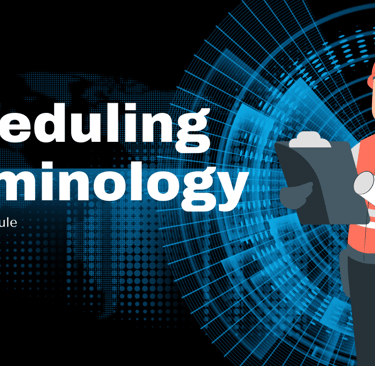Scheduling Terminology Training & Assessment eLearning Module
To support new team members in mastering essential scheduling concepts, I created a comprehensive eLearning module and assessment focused on scheduling terminology. The goal was to close knowledge gaps that caused errors and inefficiencies in day-to-day operations.
The training introduced key terms through interactive examples, followed by scenario-based questions where learners applied the terminology in realistic scheduling situations. The final assessment ensured learners could not only recall the terms but also use them accurately in their roles.
Impact: By reinforcing critical scheduling vocabulary, this training improved consistency, reduced miscommunication, and increased learner confidence in handling scheduling tasks.
Why this works better
Plain language → “close knowledge gaps,” “reduced miscommunication” (instead of “evaluate the proficiency of learners”)
Context + outcome → Shows why the training mattered and what it achieved
Action verbs → “Created,” “introduced,” “reinforced,” “improved”
New Hire Orientation: Make the Moment eLearning Module
To improve onboarding for new event staff, I designed and developed an eLearning module focused on core hospitality skills, including proper table setting and basic serving techniques.
Previously, training relied heavily on shadowing during live events, which was inconsistent and time-consuming. The new digital module streamlined the process by delivering clear, standardized instruction that new hires could complete before their first event.
Impact: This eLearning replaced the traditional shadowing method, saving time for experienced staff, ensuring consistent training quality, and giving new hires the confidence to perform key tasks. With on-demand access, learners could review material anytime, leading to faster ramp-up and improved performance during events.
Why this works
Starts with the problem → shadowing was inconsistent and inefficient
Shows the solution → standardized, digital eLearning module
Highlights the outcome → faster onboarding, consistent training, confident new hires
Remote Work Ergonomics: Introductory eLearning Module
With more employees working from home, I designed an introductory eLearning module to help remote workers create healthier, more productive workspaces.
The course introduced the fundamentals of ergonomics through interactive content and multimedia examples, guiding learners on how to optimize workstation setup and daily habits to prevent strain and boost focus.
Impact: By providing practical, actionable strategies, this module helped remote employees improve comfort, reduce risk of injury, and enhance overall productivity while working from home.
Why this works
Problem/Need → remote workers lack ergonomic setup guidance
Solution → engaging eLearning with interactive, multimedia content
Outcome → healthier work habits, improved comfort and productivity
Articulate Storyline
Power Skills: Customer Service Training Program
I designed this training program to strengthen essential customer service skills and elevate the overall customer experience.
The course focused on building “Power Skills” — the ability to consistently deliver empathetic, personalized solutions rooted in a clear understanding of customer needs. Through scenario-based activities and guided practice, learners developed confidence in applying these skills during real interactions.
Impact: By emphasizing empathy and personalization, this program helped service agents create stronger customer connections, resolve issues more effectively, and contribute to higher satisfaction scores.
Why it works:
Problem/Need → elevate customer service interactions
Solution → scenario-based training focused on empathy & personalization
Outcome → stronger connections, improved resolutions, better CX
Leadership Essentials: eLearning Module
I designed this eLearning module to highlight the critical role of leadership in driving team performance.
The course emphasized that effective leaders achieve results not by completing tasks themselves, but by cultivating trust, inspiring confidence, and influencing others. Learners explored how credibility, reputation, and character form the foundation of trust-based leadership through interactive scenarios and reflective activities.
Impact: By helping leaders understand and apply trust-building strategies, this module strengthened leadership skills, improved team cohesion, and fostered a culture of accountability and high performance.
Why it works:
Problem/Need → leaders need to inspire performance beyond task execution
Solution → interactive eLearning focused on trust, credibility, and influence
Outcome → improved leadership effectiveness, stronger teams, better performance









